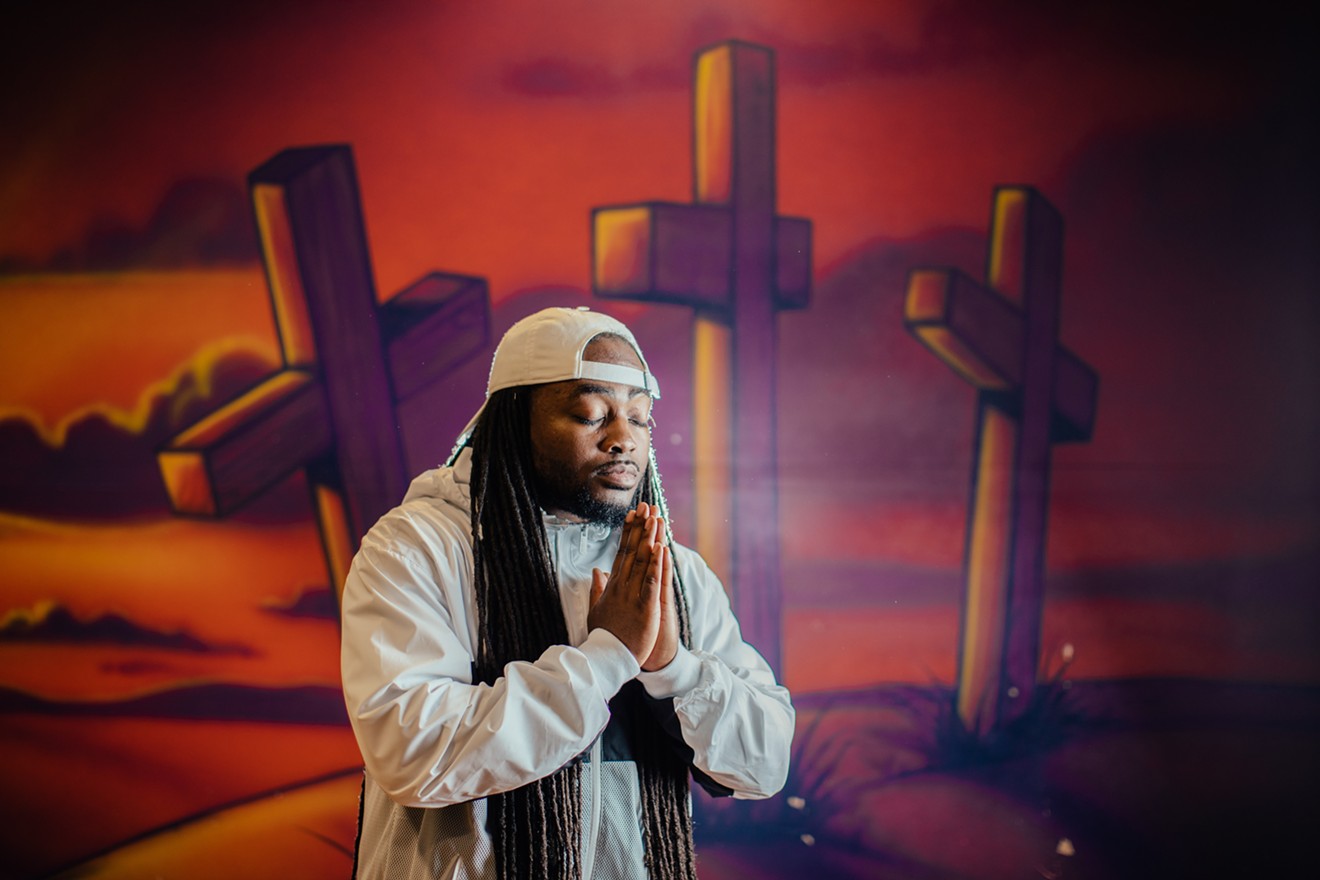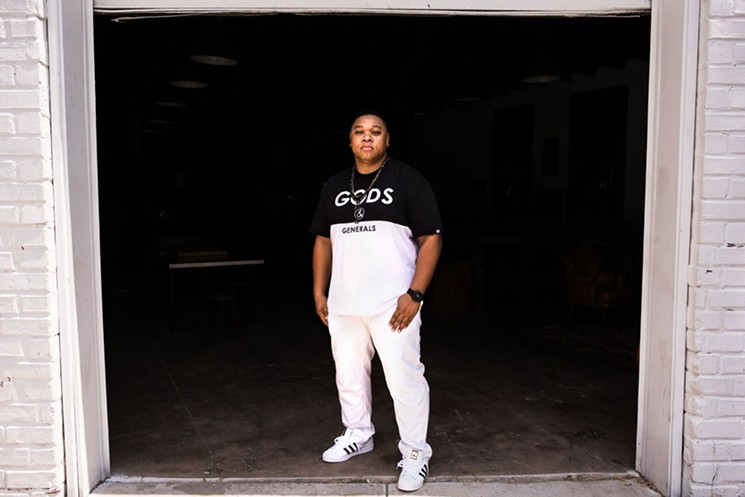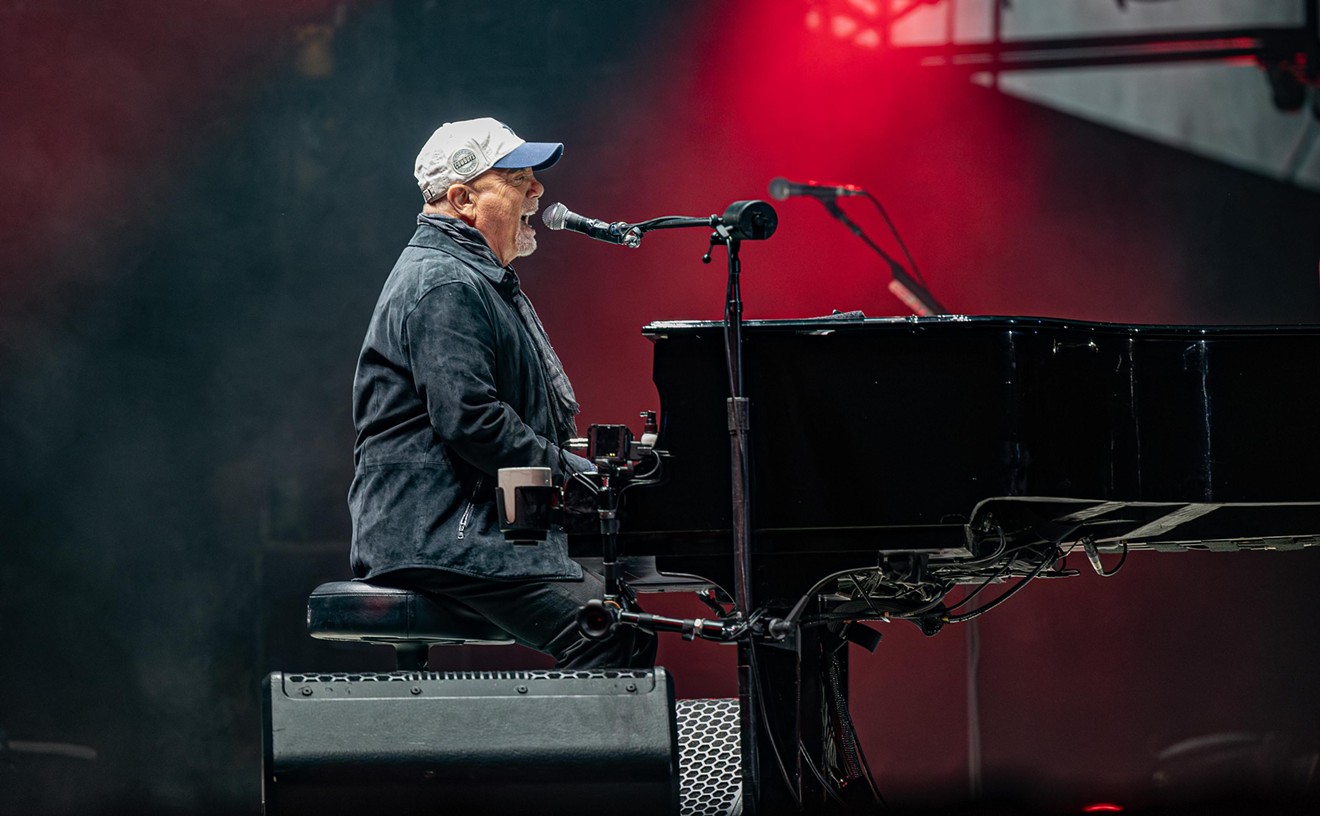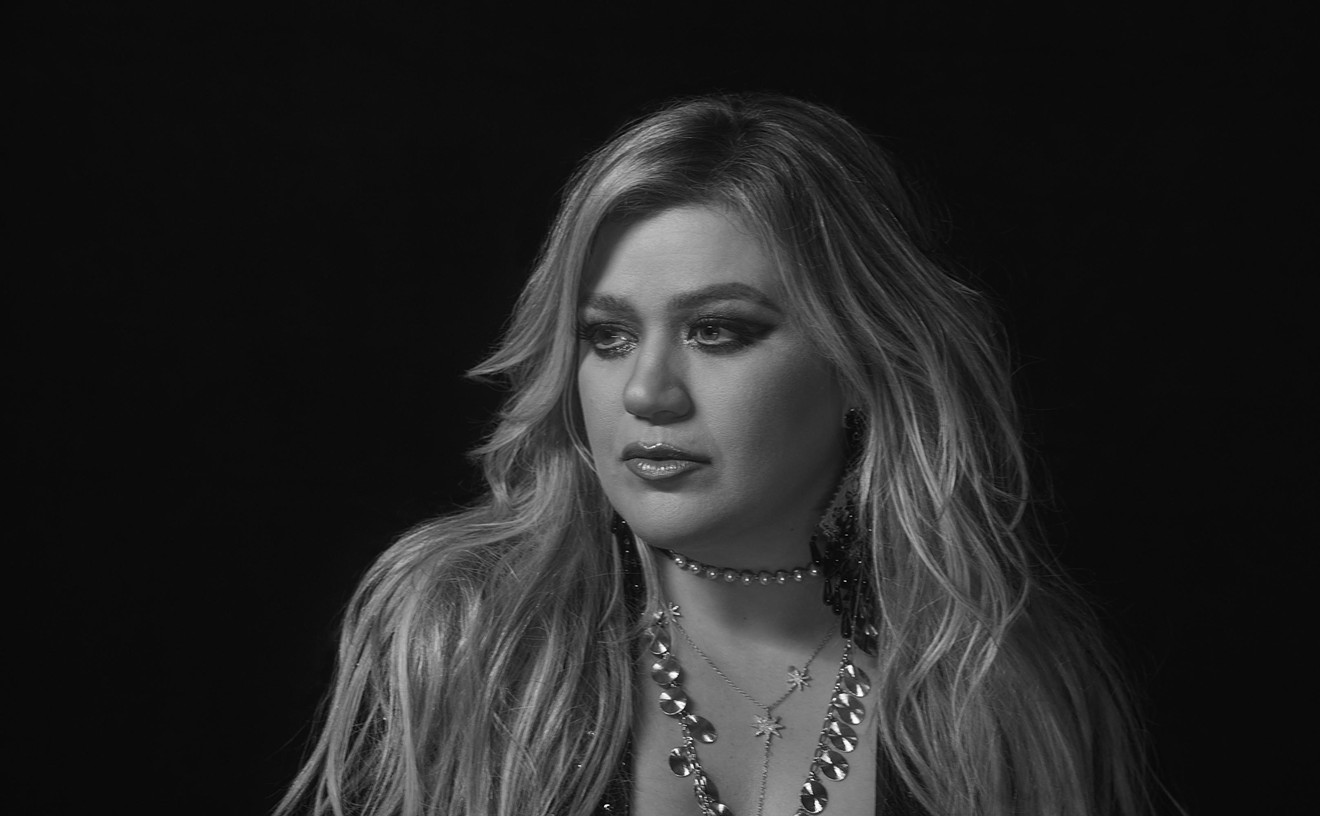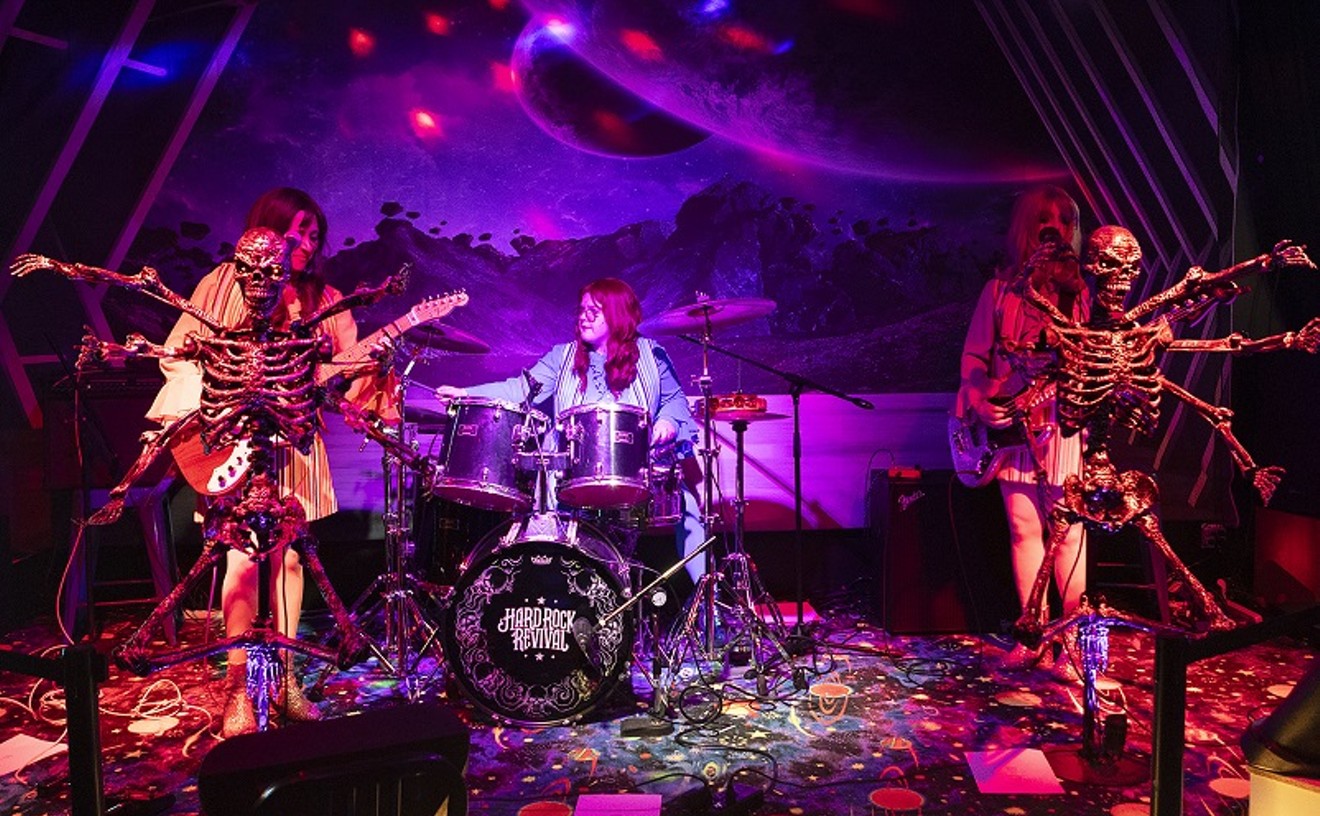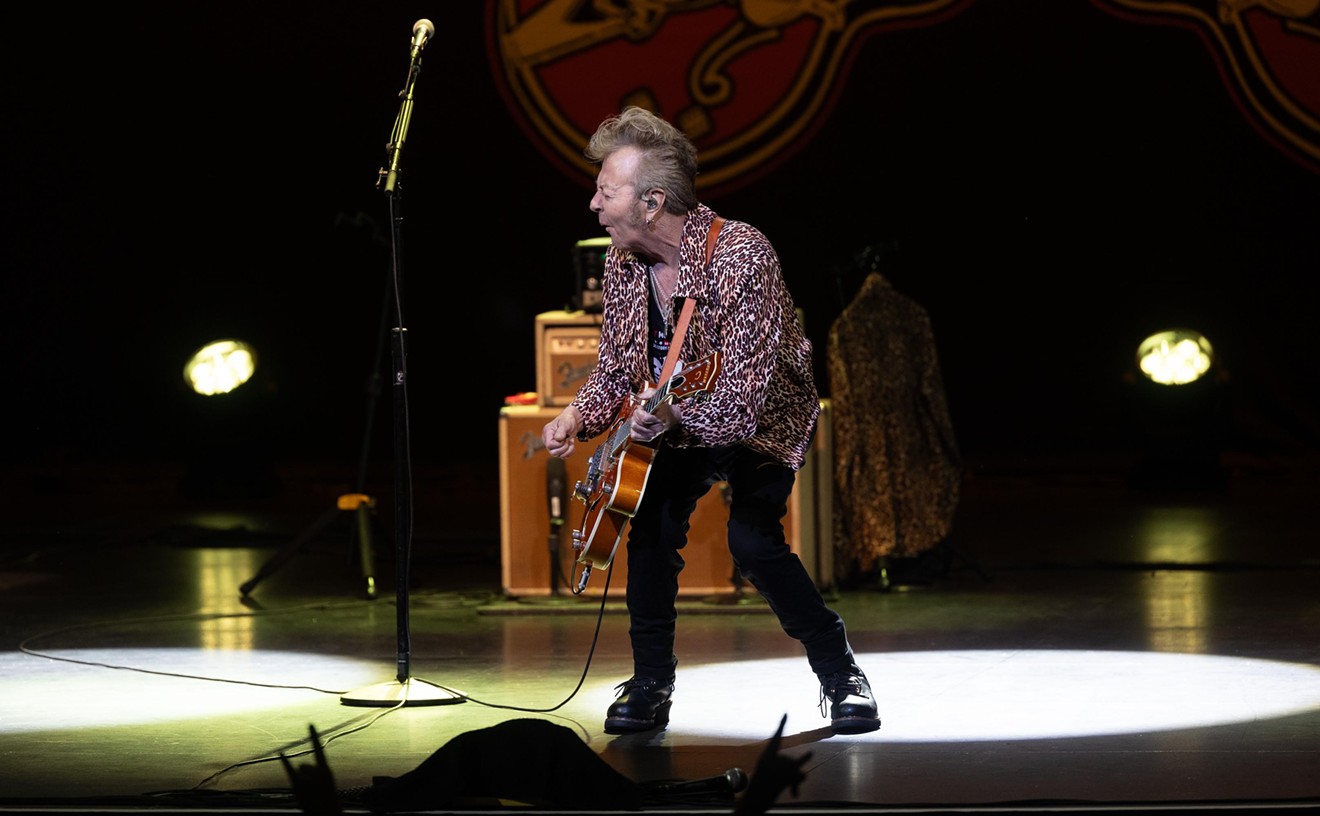"My crew is big and it keeps getting bigger, that's cause Jesus Christ is my nigga," the man raps in front of a wall with a cross on it. About a minute and 20 seconds in, a woman identified as his wife joins him.
"Jesus Christ is my nigga," she raps with a huge smile on her face. "He's the son of the original G."
The legitimacy of the video, the pastor and the pastor's church is doubtful, but the video has more than 43 million views.
It's cheesy. It's bad. It's painful. It's probably satirical, but it's what a lot of people think of when they learn that Christian rap is a real genre. Dozens of Christian rappers in Dallas use their skills to worship and minister. They don't use foul language, and they don't refer to Jesus as a crude name.
Adrion Butler has been rapping for Jesus for about seven years, but he wasn’t always set on being a Christian rapper.
“I wanted to be a producer in the secular world,” he says. “We call it secular world.”
While he pursued a career as a secular producer, a friend asked him to DJ at a church. After he freestyled a song called “Walk Like Jesus,” people started asking him where they could hear more of his stuff.
“They loved it,” Butler says. “The profession chose me.”
It’s a Wednesday night at Oak Cliff Bible Fellowship, and hundreds of students are inside the church’s youth building. It’s the week of vacation Bible school, and Butler and ShySpeaks, another musician, have been hired to perform a few songs for the youths, who range in age from 12-18.
ShySpeaks introduces Butler.
“Let’s turn this thing into a concert,” Butler yells into his microphone.
Butler emerges onstage. He has long dreads covered by a backward white ball cap. The youth group is hesitant. He asks everyone to move to the front of the room near the stage. The younger kids do so with excitement while the high-schoolers stay in the back with their arms crossed.
Butler tells the crowd he grew up in church, but he can’t sing and doesn’t play the drums, so he didn’t know how to worship until he found rapping.
He begins to lead the kids into a rap.
“I know who I am, and the devil can’t tell me nothing.” The kids repeat until the bass drops.
Butler, who also works as a freelance graphic designer, told the students at Oak Cliff Bible Fellowship that he grew up in the Baptist church, so while other rappers might distance themselves from the Christian label, Butler believes his duty is to embrace it.
“I’m a man of God, and as a man of God, it’s kind of my duty to let other people know,” he says. “Right now, I’m letting them know through music. When I’m 40, I’ll be letting them know through a different vehicle. I embrace it. I don’t see any problem with it. If I'm not a Christian rapper in 20, 30 years, I’ll still be a man of God.”
Dallas' Moses Uvere didn't accept the label of Christian rapper until recently. His latest and fourth album is his first to be sold under the Christian genre. His second album, Mind The Gap, was more of a clean album and didn’t focus too much on dropping Jesus’ name, mainly because the record label was secular.
“They wanted me to write more generic, universal stuff, but it still came out in my music,” Uvere says. “It’s just, I don't know how to lie.”
Uvere didn’t become a Christian until he was about 20 or 21, he says. He grew up going to church, but that’s because his parents were from Nigeria and they only knew three things about Americans — they eat pizza, they eat fried chicken and they go to church.“They wanted me to write more generic, universal stuff, but it still came out in my music. It’s just, I don't know how to lie.” – Moses Uvere
tweet this
In middle school, Uvere’s mother left his family, and he found himself angry and lost. He wanted to hang out with the cool guys in the neighborhood, but he couldn’t quite fit in.
Then he started rapping.
“They had everything I wanted,” he says. “They were talking to beautiful girls. They had nice cars. They had chains, and I was like, I want to be like them. They would never let me hang out with them because they were doing all these illegal things. However, if I rapped, they let me kick it, so that's kind of how I first got exposed to the culture.”
Uvere says when he was in high school, his dad had an experience with God, and everything in his home changed.
“Like one minute, he was like letting us do whatever,” he says. “The next minute, he's like making us read the Bible. And it was like the worst for a while.”
Soon after, Uvere prayed to a God he wasn’t sure he believed in and felt overwhelming peace. From then on, he began living his life as if God exists.
“I love fashion. I love music. I love all these things,” he says. “And I was like, well I can't do that anymore because I'm a Christian now. Whatever the fuck. That’s what I used to think, and then I started meeting people that really started saying like, no, you can use your entire life as an arena to honor God.”
He enrolled in a Bible college, Christ For the Nations in Oak Cliff, and learned he could use his rapping gift for the glory of God.
One of Uvere's albums reached the top 100 chart of iTunes, and he's been on TV shows, been the subject of magazine and newspaper stories, and traveled the world performing for churches and secular venues, including Dallas' City Tavern and Trees. He wears a folded black bandanna around his head. He curses occasionally. He drinks. He likes to enjoy a cigar with his friends — even pastors. His girlfriend became pregnant before they were married. He encourages his fans at secular venues to drink.
“I let them sell alcohol, and I encourage people to drink,” he says. “Most people will take one or two beverages and that's it. And I'll even preface it like, I know some of y'all don't drink, but we need to buy a beverage from the bar so people get paid. So I do that a lot, and bartenders are so thankful for that. Now on the other end, some of the venues don't like booking us because of that.”
Uvere, who is also the youth pastor at Irving Bible Church, says churches are more welcoming of his less-than-Christian past than some of his fans.
“You know, I was very open with all the churches about my struggles, and everyone was super dope about it,” he says. “I think I had more pushback from my fans. Like, my fans were just like really disappointed, but churches kind of understood. They had empathy and mercy on me and still asked me to come rap and share my story, and I believe that God is in the middle of it.”
ASAP Preach, who wrote his first Christian rap music while in jail for unlawfully carrying a weapon, also has a less-than-clean past. His given name is Ian Barnett, and he has tattoos all over his body, including his face. He says he’s experienced some resistance from traditional churches when he performs.“You know, I was very open with all the churches about my struggles, and everyone was super dope about it." – Moses Uvere
tweet this
“When they see me, they see somebody that’s marked up their temple, and I’m already not a Christian to them,” he says. “And they don’t know my fruits. They don’t know that God delivered me from getting tattoos. They don’t know these things until I start ministering and say this isn’t me no more.”
Vernon King, the youth minister at Oak Cliff Bible Fellowship, has been booking Christian rappers throughout his decadelong career in ministry. He’s ministered to white and black congregations and finds white people really appreciate Christian rap.
“The black culture appreciates Christian rap, but it’s not as popular as it is for the white culture,” he says. “If you go to any Christian rap concert, they are going to be majority white. It’s a couple different things. One, when you talk about the rap aspect in itself, I think to both cultures, it does something different. With the black culture, it has a lot more to do with the content ... not so much the feel of the song, but the background, the words, how can they connect with them. ... With white people, it’s more about the atmosphere, the feel. It’s rap, but it’s Christian and it’s cleaner.”
Maybe the urban culture thinks it's cheesy. In 2006, Lecrae, possibly the best-known Christian rapper, released "Jesus Muzik," a song with the line, "Riding with my top down, listening to this Jesus music." KB, another Christian rapper on the same label as Lecrae, Reach Records, has a song called "Zone Out," on which he raps, "I ain't dissing Oprah, but I'm never on my own." Later in that verse, he raps, "Wanna know how you can beat porn? Let him give you new website."
David Rivera is a fan of Christian music who listens to Uvere regularly. He became a Christian about a year and a half ago, and he says Christian rap is all he listens to now. Before becoming a Christian, he listened to secular rap, or "homicide music," as he describes it.
"I honestly thought [Christian rap] wasn't for me," he says in an Instagram message. "I wouldn't say corny I thought but more like boring. But God soften this heart now so it's all I listen to."
Tedashii, who resides in Atlanta is also signed to Reach Records. He has sold nearly 175,000 albums and is the host of his own show, Serium, powered by NGEN Radio.
Several Dallas Christian rappers credit Tedashii and his label-mates with paving the way for them to do what they do.
Tedashii agrees with King on the fan base.
"I do think a lot of fans of Christian hip-hop are white fans," Tedashii says. "And as far as black people or churchgoers or whatever thinking it’s cheesy, I see both. I've seen white and black people thinking it’s corny. And then I've seen the other side of that and seen people embrace it."
He says hip-hop has always been part of his cultural DNA and the soundtrack to his life. It's what he heard first, what his mom said no to (making him like it more) and what he wanted to play for his friends."I do think a lot of fans of Christian hip-hop are white fans." – Tedashii
tweet this
"If that's who you are and how you are, when you get someone saying, 'Hey, here's some hip-hop, too,' and it's not from the things you know, then instantly you're going to judge it and probably dismiss it," Tedashii says.
He says the label of Christian rapper is sometimes applied to artists who don't categorize themselves that way.
Tedashii says he makes music from the heart and communicates a certain worldview. Sometimes he’s rapping about Jesus, and sometimes he's rapping about his love for his wife, “even though I think that’s as Christian as you can get,” he says.
To remove any confusion, he started to identify simply as a hip-hop artist who is Christian. Bono is a musician who is Christian, but people don't classify him as a Christian musician. Same for Tori Kelly and Justin Bieber. Hip-hop artist Chance the Rapper regularly raps about God and thanks Jesus in his acceptance speeches, but he’s not listed under Christian hip-hop on iTunes.
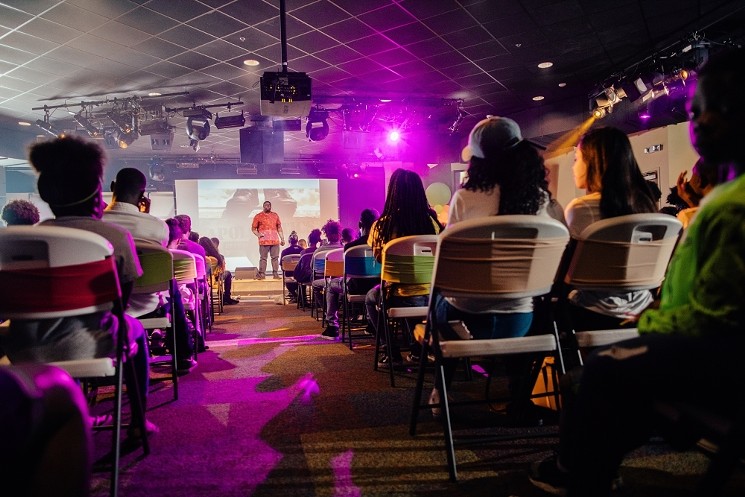
The Oak Cliff Bible Fellowship youth group watched Adrion Butler on Wednesday night for their VBS.
Kathy Tran
“It’s hard to communicate a thing as Christian itself,” Tedashii says. “The individual as a person is a Christian, but the music doesn’t necessarily get saved. The music is the overflow of the person’s heart communicating, and in that moment, I could do a whole song talking about police brutality and none of that mentions the Bible, but at some point, you’re going to get those values."
ShySpeaks, who performed with Butler at Oak Cliff Bible Fellowship, says fewer than half of her songs are about Jesus, but almost all of her songs have a biblical worldview. Although she doesn’t label herself as a Christian artist, her poems and raps mention eternity, abstaining from sex and other topics secular artists don't discuss.
“I am a Christian. I am a believer. I am a disciple to my core,” she says. “But does that mean all my music, all my art is going to be about God’s glory? Doesn’t necessarily mean so.”
ShySpeaks is one of the few females in the Christian hip-hop arena. LaToria, another Christian hip-hop artist, says she isn’t sure if churches have been hesitant to book her because of her gender, but some churches require her to wear a dress when she performs.“I am a Christian. I am a believer. I am a disciple to my core. But does that mean all my music, all my art is going to be about God’s glory? Doesn’t necessarily mean so.” – ShySpeaks
tweet this
“Different denominations have different requirements,” LaToria says. “In that moment, I have to ask why I’m doing it. I’m doing it to impact people. If I choose not to enter into that space and choose to be offended, then they will never have the opportunity to be exposed to what I do.”
Of course, not all pastors are comfortable with Christian rap. During a 2013 conference sponsored by the National Center for Family Integrated Churches, a group of panelists argued their beliefs about Christian hip-hop.
Scott Aniol, an associate professor and chair of worship ministry for Southwestern Baptist Theological Seminary, said during that panel that he opposes Christian rap. He declined an interview with the Observer, saying his thoughts are "based on so many underlying philosophical presuppositions that would be impossible to explain adequately in a short interview."
"When it comes to the art form of hip-hop, very few will disagree with the cultural milieu out of which it grew, what it was intended to express by those who created the art form," he said at the panel. "The only defense I've heard by reformed rappers of why they want to use this form is they say, 'Well we want to redeem the form of rap.'
"But when I read Scripture, whenever there's redemption, there's change. There's fundamental change. So I'm all about redemption of musical forms, but ... if we truly redeem certain musical forms to express God's holy truth, that will mean that those forms will change to actually be appropriate vehicles for the communication of God's truth as is expressed in the very word of God itself."
Joel Salazar, DJ and owner of Too Fresh Productions, says he's seen Christian rappers be successful at rap battles even though they have a limited vocabulary because they don't curse.
Although hip-hop began as a voice for the disenfranchised African-American youths, Salazar says Christian hip-hop is a way for the rappers to express themselves.
"I can see the correlation with why people want to speak this medium and rapping and hip-hop in general," he says. "The rapping as one of the elements of hip-hop was just one of the mediums used within the culture of hip-hop for young people to use to express themselves. Whether that be through economic hardships or anything they're seeing around them, it's just a way for them to translate what's going on with them in their lives to people who might have the same interest. And I think that's what Christian rappers go through all the time."

